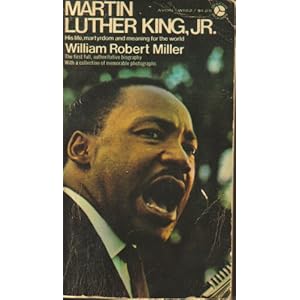It's been a while since I blogged. Sorry about that. I've been busy relocating to Grande Cache, acquainting myself with the town and the new job, and getting used to the elevation. The view out my window is a bit of rugged bush, pretty average for this part of the country. The weather is unusual today; half the sky is blue and the other half is grim. We are on the grim half of town. A dusting of snow whips by.
Anyways, I am taking a moment to capture the big thoughts I had while finishing "Martin Luther King Jr., His life, martyrdom and meaning for the world" by Willaim Robert Miller. Written by a pacifist, this biography offers a balanced picture of Dr. Martin King. His stellar achievements and crushing doubts are described equally faithfully. Offered most sympathetically are Dr. King's views on pacifism. In short, push leaders to change - and change now - before the pressure cooker explodes. To the demonstrators, be generous in victory; suppress the urge for revenge. Only this way can positive change result. Here are a few quotes I am preserving,
"[On Mordecai Johnson] ...he had shown ho to harness the redemptive power of love to social issues, and through it, change had come." (p. 30)
"...but both Brightman and his associate, L. Harold DeWolf, had a permanent effect in shaping Martin's lifelong belief in a personal God and in the dignity and worth of every human person." (p. 34)
"King told the crowd that the was often advised to slow down the pace of the freedom revolution, that time would tke care of things. But time is neutral.'It can be used constructively and it can be used destructively. Unfortunately, the extremist, right-wing elements use their time more effectively."...Racism, he said, was a way of life for the vast majority of white Americans. The Poor People's Campaign had to control this ... The campaign would 'call attention to the gap between promises and fulfillment - to make the invisible visible.'" (p. 285)
"The death of Martin Luther King was not the cause of rioting but its occasion...King knew the reasons it was there, and he had pointed them out again and again. If this represented 'criminality', it was not something inborn but the direct result of continuous oppression, the denial of hope, the rejection of repeated appeals." (p. 293)
The big lessons in Dr. King's life are echoed today with the occupy demonstrations sweeping North America. The lessons learned when an oppressed people raise themselves up must not be ignored. Let's also not forget the danger to the unaware oppressors, of deliberate blindness, a dulling of the conscience, where stories of cruelty are suppressed or plainly disbelieved. It is too easy to polarize, demonize, belittle, and ignore change agents. If these people are our brothers, what does it say when we refuse to listen, to respond?
The same dynamics were repeated in the tumultuous modern history of Africa, that I read this past year. Ignorant oppressors are justifiably afraid of public demonstrations pointing out the less pretty side of society. Because the oppressed, once expressed, are on just this shade of violence. If they continue to be ignored.
I believe Dr. King's Poor People's Campaign was visionary. A nation that ignores it's weakest remains vulnerable. I believe these vulnerabilities have never been fullly addressed.
Just last week I posted my mixed feelings about the occupy demonstrators on a discussion board,
"There are shades of history that caution me from judgement. I'm wavering between admiration and annoyance.
•First of all, these kids are not the "other 99". They are a particular subset of society that for whatever reason, has time to check out from routine. I resent that they claim to represent me.
•I resent the 99 as much as I have come to resent the so-called "Moral Majority". As soon as the Religious Right DID gain power, they bankrupted the country. They also make poor losers.
•So I see a correlation between the "other 99" and the "Moral Majority". Both claim to represent an invisible and silent minority; both are more dogmatic than sensible. They should own up that they represent their own sectarian interests.
•To the protester's defence, I think the widening gap between rich and poor is a dreadful testament for a wealthy country. I studied the Human Development index published by the United Nations a few years ago. That widening gap is a pretty good darn indicator that at some point something was going to snap. It is not the richest who earn a nation's pride, it's the country's poorest. What are we doing for those most disadvantaged? There must be a rebalancing of wealth. If the wealthiest won't do it voluntarily, the government (vocal, voted majority) should intervene.
•Be cautious in accepting wild stories happening at these sit-ins. Remember that the boomers of today were hippie protesters of yesteryear. The establishement reacted badly back than. I would like my generation to show greater tolerance. We don't have to set out the dogs or tear gas, do we?"
In conclusion, even though I am doubtful that the demonstrators represent the "other 99", and skeptical of their choice of demons (Corporate America, Big Business), they do express a raging unmet need.
Leaders listen.
As a postscript, I found the story of Dr. King's emerging faith during college to be personally inspiring. It is encouraging to read how a man with highly individual and tested beliefs could find his way in his church of choice. I'm not so sure the denominations of today have fully taken up his challenge of social responsibility. I note that even the liberal churches today are content to passively petition their governments to do more. There must be personal involvement, I would think, for active change to come about.
